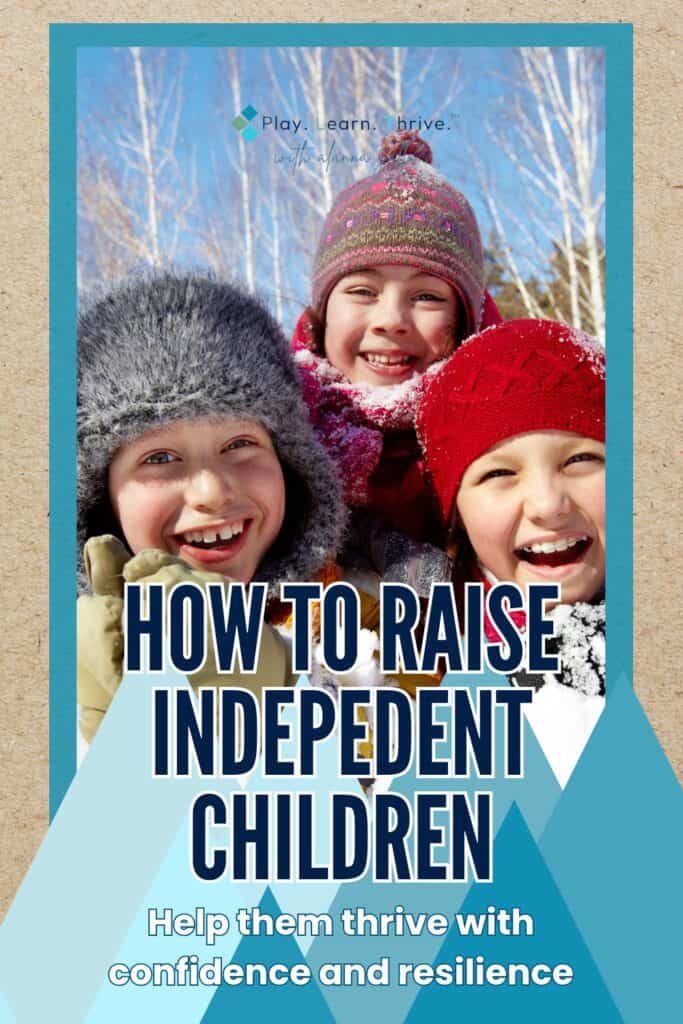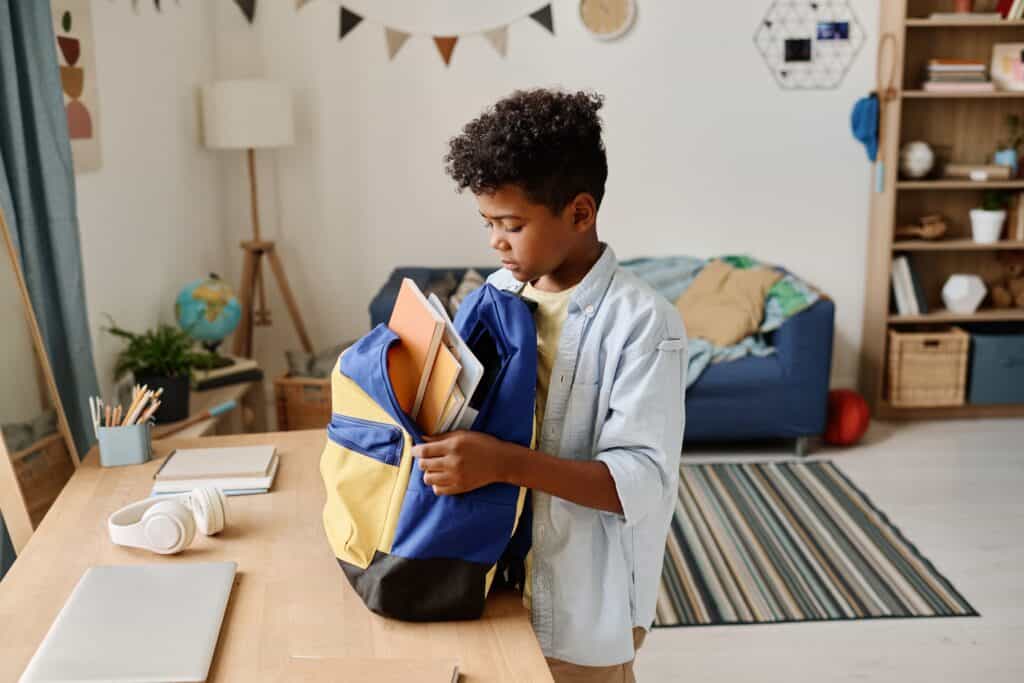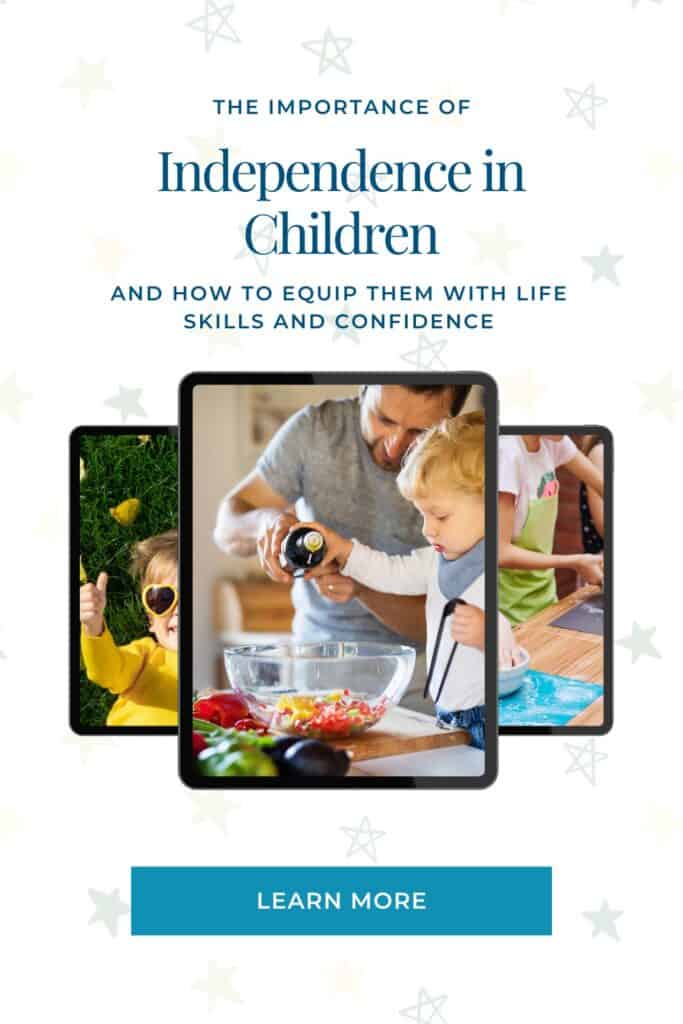How to Raise an Independent Child
Learn how to raise an independent child with practical tips and strategies that foster self-reliance, confidence, and resilience.

Play. Learn. Thrive.™ only endorses products we authentically love and use. Some of the product links in this post may be affiliate links. That means that if you click them and make a purchase, this site makes a commission. Play. Learn. Thrive.™ is also an Amazon Associate. As an Amazon Associate, we earn from qualifying purchases. It will have no impact on the price you pay or the experience of your purchase.
Raising an independent child is one of the greatest gifts you can give as a parent. In a world where children are often over-scheduled, over-protected, and dependent on adults for decision-making, fostering self-reliance is crucial.
Welcome back to Play. Learn. Thrive, a blog dedicated to helping you raise confident, lifelong learners. I’m Alanna Gallo, a former teacher with a master’s in education who saw firsthand how kids were losing confidence, independence, and their natural love of learning.
I left the classroom to help parents raise curious, capable, and screen-conscious kids in a world that doesn’t make it easy. My work has been featured in major media outlets, and I’m here to give you real, research-backed advice—without the guilt trips or unrealistic expectations.

Independence doesn’t mean pushing kids to grow up too fast; rather, it’s about equipping them with the skills, confidence, and mindset they need to navigate life with resilience and capability.
Why Independence Matters
An independent child is one who can think critically, solve problems, and take responsibility for their actions. Research shows that children who are given the freedom to make choices, manage challenges, and experience failure in a safe environment develop stronger executive functioning skills. These skills—self-regulation, decision-making, and problem-solving—are essential for success in adulthood.
Additionally, fostering independence in childhood leads to:
- Higher self-esteem and confidence – When children learn to trust their abilities, they feel capable and empowered.
- Better problem-solving skills – Kids who practice making choices and dealing with setbacks develop resilience and adaptability.
- Stronger motivation and perseverance – Independent kids are more likely to develop intrinsic motivation rather than relying on external rewards or validation.
- Improved emotional regulation – The ability to manage emotions and setbacks is critical to navigating challenges throughout life.

Practical Ways to Raise an Independent Child
1. Encourage Free Play and Exploration
One of the simplest ways to nurture independence is by allowing children plenty of unstructured playtime. Play is where kids develop creativity, risk-taking, and problem-solving skills. Instead of constantly directing their play, give them open-ended materials—blocks, art supplies, or natural objects—and let them take the lead.
Free play also teaches children how to entertain themselves without relying on screens or adult guidance. When kids are constantly told what to do, they miss out on opportunities to develop self-sufficiency.
2. Let Them Make Age-Appropriate Choices
Giving children opportunities to make decisions fosters confidence and critical thinking. Start small:
- Allow a toddler to choose between two outfits.
- Let a preschooler decide which book to read at bedtime.
- Encourage an elementary-aged child to pick a family meal and help prepare it.
By giving choices, you signal that their opinions matter, and you help them practice decision-making in a low-stakes environment.
3. Teach Life Skills from an Early Age
Children thrive when they feel capable of handling real-world tasks. Teaching them life skills not only builds confidence but also instills a sense of responsibility. Even young children can help with:
- Setting the table
- Folding laundry
- Watering plants
- Packing their own backpacks for school
As they grow, gradually increase responsibilities, such as managing money, preparing simple meals, or learning basic problem-solving techniques when things go wrong.

4. Allow Safe Risk-Taking
Parents often fear letting their children take risks, but small challenges are essential for growth. Climbing trees, using real tools under supervision, or solving playground conflicts without immediate adult intervention builds resilience.
Instead of saying, “Be careful!” try, “Think about where you’re placing your feet,” or “What’s your plan if that doesn’t work?” This shift in language encourages problem-solving rather than fear.
5. Foster a Growth Mindset
A growth mindset—the belief that abilities and intelligence can be developed through effort—encourages independence. When children understand that mistakes are learning opportunities rather than failures, they become more willing to try new things and persist through challenges.
Ways to encourage a growth mindset include:
- Praising effort over outcomes (“I love how you kept trying!” rather than “You’re so smart!”)
- Modeling resilience by sharing your own mistakes and what you learned
- Encouraging problem-solving instead of immediately stepping in to fix things
6. Step Back and Let Them Struggle
It’s tempting to rush in when a child is struggling, but over-helping can undermine their ability to develop problem-solving skills. If your child is frustrated with a task, resist the urge to take over. Instead, provide guidance and encouragement: “I see you're having a hard time. What could you try next?”
Learning to handle frustration is an essential skill. If children never experience struggle, they won’t build the resilience needed to navigate real-world challenges.

7. Set Clear Expectations and Natural Consequences
Independence doesn’t mean letting children do whatever they want. It involves setting clear expectations and allowing natural consequences to unfold. If a child forgets their homework, resist the urge to bring it to school. If they don’t put away their bike, let them experience the inconvenience of not having it for a day.
When children experience the results of their choices, they learn responsibility without constant nagging or punishments.
8. Encourage Problem-Solving
When a child faces a problem—whether it's a spilled drink or a friendship issue—resist the urge to provide immediate solutions. Instead, ask open-ended questions:
- “What do you think we should do about this?”
- “What are some ways we could solve this problem?”
This approach shifts the responsibility onto the child and builds their confidence in handling challenges independently.

9. Teach Emotional Regulation and Self-Awareness
Independence isn’t just about physical skills—it also involves managing emotions and behaviors. Teaching kids to recognize and regulate their emotions helps them navigate challenges without relying on others to fix things for them.
Ways to support emotional independence include:
- Encouraging deep breaths or mindfulness when they feel overwhelmed
- Helping them name their emotions (“It looks like you're feeling frustrated. Want to talk about it?”)
- Offering problem-solving tools, like journaling or talking through tough situations
10. Model Independence Yourself
Children learn most by watching the adults around them. If they see you tackling challenges, making decisions, and managing responsibilities with confidence, they’ll internalize those behaviors. Share your thought process when solving a problem, making a decision, or learning something new.
For example: “I’m not sure how to fix this, but I’m going to research and figure it out.” This kind of modeling shows kids that independence is a skill that develops over time.
Raising an independent child doesn’t happen overnight. It requires patience, trust, and a willingness to step back and let them navigate life’s challenges. By fostering independence through play, decision-making, life skills, and problem-solving, you’ll equip your child with the confidence and resilience they need to thrive.

Remember, independence is not about doing everything alone—it’s about having the skills and confidence to navigate life with competence and self-trust. When children know they are capable, they step into the world with courage and curiosity, ready to take on whatever comes their way.
Inspired by this post? Be sure to subscribe download my free Screen-Free Starter Kit! For more insights and resources on raising confident, lifelong learners, be sure to follow me on Instagram – can't wait for you to join me!
If you enjoyed this article about raising independent children, you may also like:
- The Power of a Growth Mindset
- Risky Play: Why It’s Essential for Your Child’s Growth and Development
- Why Boredom is GOOD for your child & How to Let it Happen







